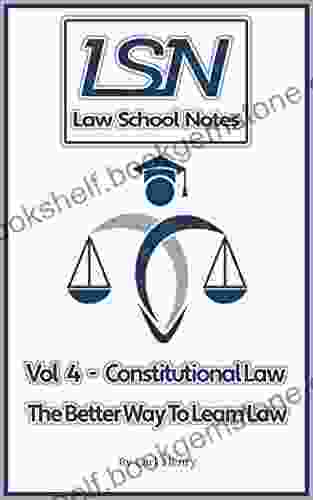
Constitutional law is a fascinating and complex field of study. It is the foundation of our legal system and governs the relationship between the government and its citizens. If you are interested in pursuing a career in law, it is important to have a strong understanding of constitutional law. In this article, we will provide you with a comprehensive overview of constitutional law, including its history, major concepts, and key cases.
4.6 out of 5
| Language | : | English |
| File size | : | 1316 KB |
| Text-to-Speech | : | Enabled |
| Screen Reader | : | Supported |
| Enhanced typesetting | : | Enabled |
| Print length | : | 339 pages |
| Lending | : | Enabled |
History of Constitutional Law
The history of constitutional law can be traced back to the Magna Carta, which was signed in 1215. The Magna Carta was a charter that limited the power of the king and established the principle of due process of law. In the centuries that followed, constitutional law continued to develop through a series of landmark cases and decisions. In the United States, the Constitution was adopted in 1789. The Constitution is the supreme law of the land and establishes the framework for our government. The Constitution has been amended 27 times, with the most recent amendment being adopted in 1992.
Major Concepts of Constitutional Law
Constitutional law is based on a number of key concepts, including:
- Federalism: This is the division of power between the federal government and the state governments. The Constitution establishes a system of dual sovereignty, in which both the federal government and the state governments have their own powers and responsibilities.
- Separation of powers: This is the division of power among the three branches of government: the legislative, executive, and judicial branches. The Constitution establishes a system of checks and balances, in which each branch of government has the ability to limit the power of the other branches.
- Due process of law: This is the principle that requires the government to follow certain procedures before depriving a person of life, liberty, or property. The Due Process Clause of the Constitution protects individuals from arbitrary and unjust government action.
- Equal protection of the laws: This is the principle that requires the government to treat all persons equally under the law. The Equal Protection Clause of the Constitution prohibits the government from discriminating against individuals based on their race, religion, gender, or other protected characteristics.
- Freedom of speech: This is the right to express one's opinions and ideas without fear of government censorship. The First Amendment of the Constitution protects freedom of speech, press, religion, and assembly.
Key Cases in Constitutional Law
There have been many landmark cases in constitutional law history. Some of the most important cases include:
- Marbury v. Madison (1803): This case established the principle of judicial review. The Supreme Court ruled that it has the power to declare laws unconstitutional.
- Dred Scott v. Sandford (1857): This case ruled that African Americans were not citizens of the United States and could not sue in federal court. This decision was overturned by the Civil War Amendments.
- Brown v. Board of Education (1954): This case ruled that racial segregation in public schools was unconstitutional. This decision overturned the Supreme Court's previous ruling in Plessy v. Ferguson (1896),which had established the "separate but equal" doctrine.
- Roe v. Wade (1973): This case ruled that women have a constitutional right to abortion. This decision has been the subject of much controversy and remains a hotly debated issue today.
Constitutional law is a complex and fascinating field of study. It is the foundation of our legal system and governs the relationship between the government and its citizens. If you are interested in pursuing a career in law, it is important to have a strong understanding of constitutional law. In this article, we have provided you with a comprehensive overview of constitutional law, including its history, major concepts, and key cases. We encourage you to continue to learn more about constitutional law and its impact on our society.












































































































































































































































































































































































































































































































































































































































